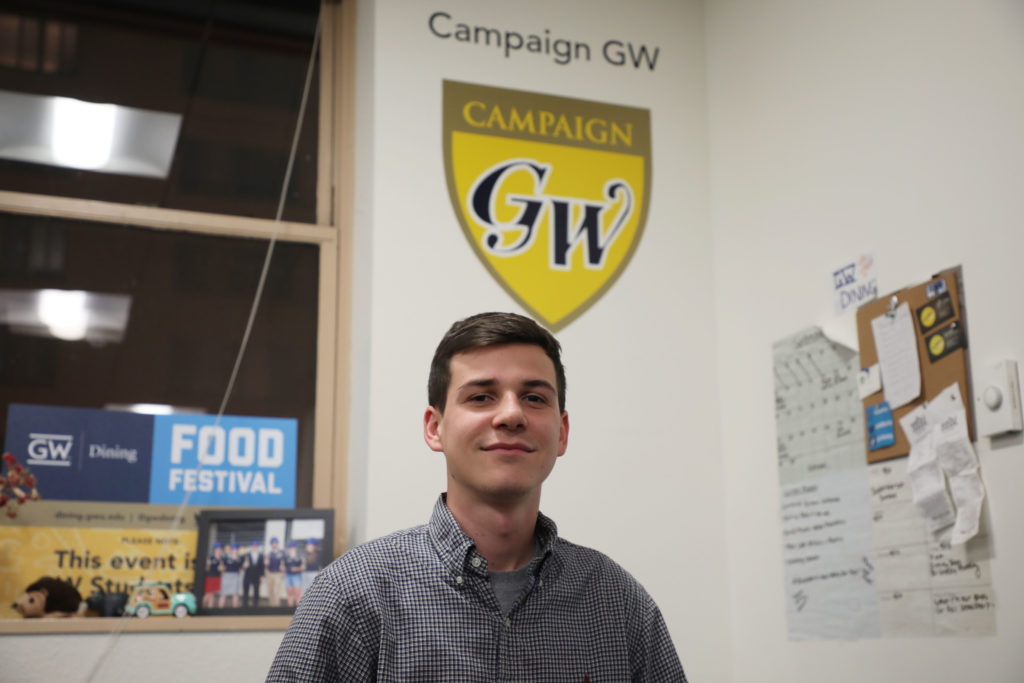More than 50 students have written letters to the D.C. Zoning Commission this month to support the Thurston Hall renovation project.
Members of Campaign GW, a student organization that advocates for sustainability measures on campus, organized a campaign to send letters to the Zoning Commission in support of Thurston’s renovation project, which officials said is set to be completed by 2022. Colin Medwick, a Campaign GW intern who helped lead the letter-writing campaign, said he hopes the letters will demonstrate to the Zoning Commission how the residence hall renovation will benefit students.
Medwick said the initiative was one facet of a larger effort to communicate to the Zoning Commission how the project will improve the freshman experience on campus. Medwick said Thurston’s renovations, which will include more community spaces, will welcome students to campus and foster community among residents.
“Everyone should make their voice heard to local government and express their feelings,” Medwick said. “One letter makes a difference in my school of thought, but obviously the volume of it matters too. I think generally a lot of students have visceral feelings towards Thurston and would like to see it new and improved.”
Medwick said Campaign GW members have currently collected more than 50 letters ready to send to the commission but want to acquire at least 100 letters before the commission’s public hearing about the renovation project Dec. 2.
“In my time working with Campaign GW, I have really grown to appreciate the design of public space as well as buildings and how that impacts our life on campus,” Medwick said. “The new Thurston is built so that the inspiration comes from how we build community spaces where students can interact.”
Officials announced plans last academic year to construct a new residence hall by the International Monetary Fund but later opted to abandon the project and instead expedite the timeline for Thurston’s renovations.
Medwick said Campaign GW is asking volunteers to attend the project’s hearing, which is open to the public. He added that the group is preparing members to support Thurston’s renovating at the hearing.
The new building is slated to achieve at least a Silver certification from Leadership in Energy and Environmental Design, according to a Nov. 12 Campaign GW email obtained by The Hatchet. LEED Silver certification indicates that a building has earned between 50 and 59 “points” in aspects like location, transportation and water efficiency, according to LEED’s website.
“Coming from a sustainability standpoint, it’s the largest residence hall on campus,” Medwick said. “That’s the most faucets being used, the showers being taken, so how can we make that more efficient?”
Sara Bardin, a D.C. Office of Zoning spokeswoman, said the Zoning Commission will review and take the letters into account when making the final decision to approve the project. She said the commission also will consider the spoken testimony given at the Dec. 2 hearing before determining whether to approve Thurston’s project.
“We are the administrative arm of the Zoning Commission, so the Zoning Commission takes all the correspondence that’s in the record into consideration when they make their decision,” Bardin said.
Trinity Diaz, the president of the Resident Hall Association, said she wrote a letter to the Zoning Commission encouraging the body to approve the project. She said the renovations would make the residence hall more comfortable because fewer students will live in the rooms.
Officials said over the summer that Thurston would hold 200 fewer students post construction.
“Letter writing helps make the Thurston Renovation more personal,” she said in an email. “If the Zoning Commission can hear stories from students on how Thurston currently is and how beneficial the improvements would be, they will understand the context behind the renovations.”
Students have long complained of mold issues in Thurston Hall, which led officials to hire a maintenance company to conduct weekly wipe-downs of residents’ Thurston bathrooms.
Diaz said the additions to Thurston Hall, like the atrium and added community spaces, will provide a space for freshmen to form relationships with one another.
“The creation of these spaces will help the University build a stronger sense of community on campus, which has become a bigger priority on campus this year especially,” Diaz said. “I think the newer space will allow for an overall better GW experience and an opportunity to transform the residential experience.”
She said the letters will communicate to the Zoning Commission students’ concerns about the residence hall and ensure that students’ concerns are heard.
“I strongly encourage students to write in support as the more personal accounts we have, the more likely the Zoning Commission will understand why we need the Thurston renovations!” she said in an email. “They won’t understand the issue unless we tell them what it is.”





